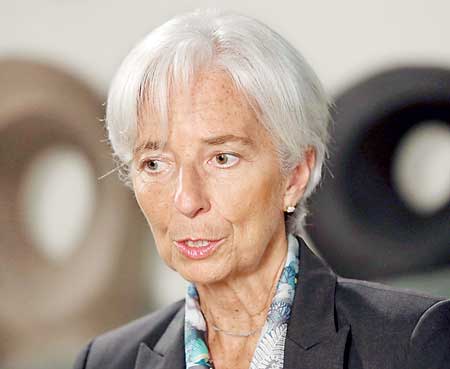Thursday Feb 19, 2026
Thursday Feb 19, 2026
Friday, 3 July 2015 00:00 - - {{hitsCtrl.values.hits}}
Reuters: One day after Greece became the first developed economy to default on a loan with the International Monetary Fund, the head of the international lender on Wednesday suggested Greece should move to reform its economy before its European creditors give it a break on its debt.
In an interview with Reuters, IMF Managing Director Christine Lagarde avoided any pointed criticism of Greek Prime Minister Alexis Tsipras but still hinted at frustrations as she noted that Greece’s economy had been on the road to recovery before the current left-wing Syriza party came to power.
Lagarde was asked which should come first, commitments to reform by Athens or relief on its debts from euro zone governments.
“Given where we are, my suspicion is it would be much preferable to see a deliberate move towards reforms (and) for that to be followed through by the other side of the balance,” Lagarde said.
Greece’s government had pushed for debt relief in months of negotiations with its European and IMF lenders on a cash-for-reform deal before Athens abruptly called a referendum.
A defiant Tsipras urged Greeks on Wednesday to reject an international bailout deal - which calls for even greater austerity measures - wrecking any prospect of repairing broken relations with EU partners before the referendum on Sunday that may decide Greece’s future in Europe.
“We do not have a choice as to who represents a country,” Lagarde said when asked about the trustworthiness of the Greeks. “And we take all governments, duly elected ... as the legitimate partner in the negotiations.”
Less than 24 hours before his combative address, Tsipras had written a conciliatory letter to creditors asking for a new bailout that would accept many of their terms.
Lagarde declined to comment on the latest offer from Athens or comment directly on whether she viewed Tsipras as a reliable negotiating partner, though she hinted at growing frustration with the Greek leader’s public negotiating stance.
“We have received so many ‘latest’ offers, which themselves have been validated, invalidated, changed, amended, over the course of the last few days, that it’s quite uncertain exactly where the latest proposal stands,” she said.
“I think there is a democratic process that is underway, and that should result in hopefully more clarity, less uncertainty as to what is the determination of the Greek people, and what is the authority of the government,” she said about the referendum.
Long lines at cash machines this week provided a stark visual symbol of the pressure on Tsipras, who came to power in January vowing to end austerity and protect the poor.
Lagarde said Greece had made progress on many difficult reforms and had started to return to growth before Syriza came to power.
“What I find really concerning is the fact that after those years, as growth was beginning to pick up, as the country was beginning to generate a surplus, then suddenly there is this massive backtracking, which puts us backwards,” she said.
The IMF has been criticised for breaking its own rules in lending to Greece and endorsing austerity measures proposed by the European Commission and the European Central Bank, the IMF’s partners in the troika of Greece’s lenders.
Lagarde, who became chief of the IMF four years ago, as the IMF was in the midst of massive bailouts across the euro zone, defended the international lender’s track record, saying it helped other countries that received its support including Ireland and Portugal.
“It is the case that during the crisis, sometimes, there had to be creativity, new processes,” she said, “but I think we’ve always tried to respect the rules and to be as even-handed as we could.”